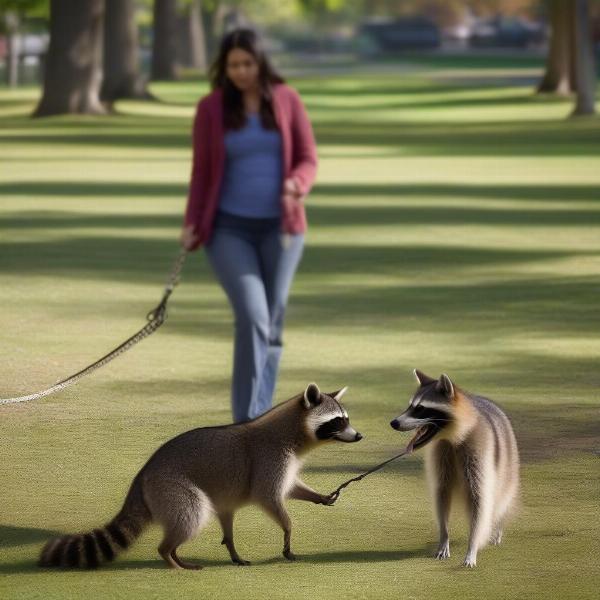Raccoons are notorious for their cleverness and adaptability, while dogs are known for their loyalty and protective instincts. So, can a dog beat a raccoon? The answer isn’t a simple yes or no. Many factors influence the outcome of such an encounter, including the size and breed of the dog, the raccoon’s size and aggression level, and the environment where the confrontation takes place. This article will delve into the complexities of a potential dog vs. raccoon showdown, exploring the strengths and weaknesses of each animal and offering insights into what might happen if these two creatures cross paths.
Dogs possess several advantages in a potential fight. Their larger size, powerful jaws, and sharp teeth can inflict significant damage. Breeds like German Shepherds, Rottweilers, and Pit Bulls are particularly strong and have a higher bite force. However, a dog’s protective instincts, while admirable, can also be a disadvantage. A dog might be more inclined to defend its territory or family, putting itself at risk against a wild animal like a raccoon.
Raccoons, despite often being smaller than dogs, are formidable opponents. Their sharp claws, agile bodies, and surprisingly strong bite can cause serious injury. They are also incredibly intelligent and resourceful, able to adapt to different situations quickly. Furthermore, raccoons are known for their ferocity when cornered or protecting their young. Their thick fur provides some protection against bites, and their dexterity allows them to maneuver quickly and effectively.
Size and Breed Matter: Evaluating the Canine Contender
The outcome of a dog vs. raccoon encounter heavily depends on the dog’s size and breed. A small dog, such as a Chihuahua or a Pomeranian, would be significantly outmatched by even a small raccoon. Larger breeds, like German Shepherds or Great Danes, have a better chance of winning a physical altercation. However, even large dogs can be injured by a raccoon’s sharp claws and teeth.
Considering Canine Temperament
Beyond size and breed, a dog’s temperament also plays a crucial role. A dog that is naturally aggressive or protective might be more likely to initiate a confrontation, while a more timid dog might try to avoid the raccoon altogether.
The Raccoon’s Arsenal: More Than Just Cute and Cuddly
While often perceived as cute and cuddly, raccoons are wild animals with a survival instinct. Their sharp claws are designed for climbing and digging, but they are also effective weapons. Raccoons are surprisingly strong for their size and possess a powerful bite. They are also known for their intelligence and cunning, often outsmarting their opponents.
Raccoon Behavior and Defense Tactics
Raccoons are typically nocturnal and prefer to avoid confrontation. However, they will defend themselves fiercely if cornered or if they perceive a threat to their young. They might hiss, growl, or even charge at a perceived threat. Their agility and quick reflexes allow them to evade attacks and inflict damage with their claws and teeth.
What to Do if Your Dog Encounters a Raccoon
If your dog encounters a raccoon, the best course of action is to prevent a fight. Call your dog back immediately. Do not attempt to intervene directly, as you could be injured. If a fight does break out, make loud noises to try and scare the raccoon away. Once the raccoon is gone, check your dog for any injuries and contact your veterinarian if necessary.
 Preventing a Dog-Raccoon Fight
Preventing a Dog-Raccoon Fight
Conclusion: Avoiding the Showdown
While the question of “can a dog beat a raccoon?” is intriguing, the best outcome is to avoid a confrontation altogether. Understanding the strengths and weaknesses of both animals can help you take steps to prevent a potentially dangerous encounter. Keeping your dog on a leash, especially at night, and securing your garbage cans can minimize the chances of a raccoon encounter.
FAQ:
- Are raccoons dangerous to dogs? Yes, raccoons can be dangerous to dogs. They can transmit diseases and inflict serious injuries with their claws and teeth.
- What should I do if my dog is bitten by a raccoon? Contact your veterinarian immediately. Raccoon bites can transmit diseases, so prompt medical attention is crucial.
- How can I keep raccoons away from my property? Secure your garbage cans, avoid leaving pet food outdoors, and remove any potential den sites, such as woodpiles or access under decks.
- Do raccoons attack dogs unprovoked? Raccoons generally avoid confrontation but will defend themselves if cornered or if they perceive a threat to their young.
- What diseases can raccoons transmit to dogs? Rabies, roundworm, and leptospirosis are some of the diseases raccoons can transmit to dogs.
- Are all dog breeds equally vulnerable to raccoon attacks? Smaller dog breeds are more vulnerable due to their size.
- Can a dog kill a raccoon? Yes, a larger dog could potentially kill a raccoon, but it is also likely to sustain injuries in the process.
Find More Helpful Information on ILM Dog:
[Link to relevant article 1 on ilmdog.com]
[Link to relevant article 2 on ilmdog.com]
ILM Dog is your go-to resource for expert advice on dog care and wellbeing. We offer a wealth of information on everything from breed selection and puppy care to senior dog health and training tips. Our team of experienced writers and dog enthusiasts are dedicated to providing practical, trustworthy advice to help you give your furry friend the best possible care. Whether you’re a new dog owner or a seasoned pro, ILM Dog has the resources you need to navigate the joys and challenges of dog ownership. Contact us at [email protected] or +44 20-3965-8624 for personalized advice. For more valuable insights and expert guidance on all things dog-related, visit ILM Dog.